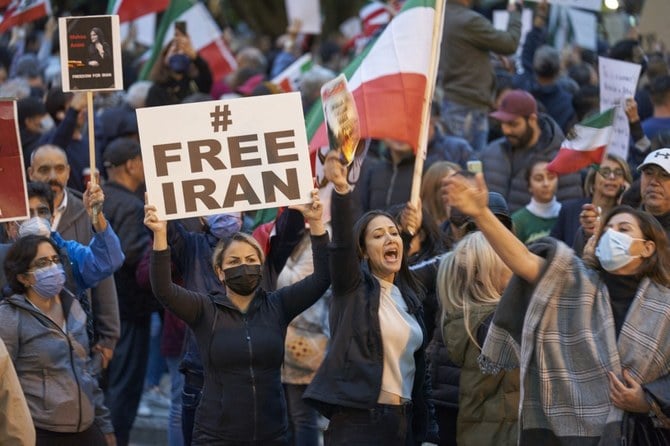
For a week, protesters have cut access to Basra’s Umm Qasr port, which brings in most of Iraq’s food and medical imports
Rights groups have raised the alarm over the arrest and intimidation of activists and medics
BAGHDAD: Anti-government protests in Iraq entered their third week on Friday amid fresh bloodshed, but leaders appeared to have closed rank around the country’s embattled premier.
More than a dozen demonstrators had died in the capital Baghdad and the southern port city of Basra within 24 hours, medical sources told AFP on Friday.
That pushed the death toll since the first protests erupted on October 1 closer to 300, according to an AFP tally kept as officials have stopped providing updated figures.
In Basra, seven protesters were killed in confrontations on Thursday and early Friday, with security forces trying to reopen roads blocked by sit-ins, medical sources said.
For a week, protesters have cut access to Basra’s Umm Qasr port, which brings in most of Iraq’s food and medical imports.
In Baghdad, six people died facing off against security forces Thursday, a medical source told AFP.
Despite the violence, thousands again flocked to the capital’s main protest camp in Tahrir (Liberation) Square on Friday, including members of Iraq’s influential tribes.
“We sacrificed the blood of our tribe’s sons,” said one tribe member who had traveled from the southern city of Nasiriyah.
“We won’t stop until the government resigns.”
Meanwhile, Iraq’s top Shiite Muslim cleric urged security forces on Friday to avoid using excessive force to quell weeks of anti-government unrest as authorities grapple with the country’s biggest crisis in years.
Grand Ayatollah Ali Al-Sistani, who only speaks on politics in times of crisis and wields enormous influence over public opinion in Shiite-majority Iraq, held security forces accountable for any violent escalation and urged the government to respond as quickly as possible to demonstrators’ demands.
“The biggest responsibility is on the security forces,” a representative of Sistani said in a sermon after Friday prayers in the holy city of Kerbala. “They must avoid using excessive force with peaceful protesters.”
Throughout Thursday night, loud blasts had echoed from around Tahrir as security forces tried to hold off protesters attempting to cross four bridges over the Tigris.
The bridges have become the main battlefront in Baghdad, as protesters mass around them in a bid to reach government offices and foreign embassies on the western bank.
To keep them back, security forces have built up barricades, fired volleys of tear gas and stun grenades and resumed using live ammunition in recent days.
Even the use of tear gas has been deadly, with medics and rights groups documenting security forces firing canisters at point-blank range instead of up in the air to allow the gas to disperse.
The canisters have pierced protesters’ skulls and chests, with the United Nations saying at least 16 people had been killed that way as of November 5.
Amnesty International said it had found the military-grade canisters were Serbian- and Iranian-made.
Rights groups have also raised the alarm over the arrest and intimidation of activists and medics, who have reported being followed by unidentified security forces.
In Missan province, two activists were killed on Wednesday by unknown assailants, security sources said.
This week’s violence has raised to around 130 the death toll since the protests resumed on October 24 after a lull.
A first wave of rallies from October 1 to 6 had killed 157 people, according to an official probe, most of them protesters shot dead in Baghdad.












